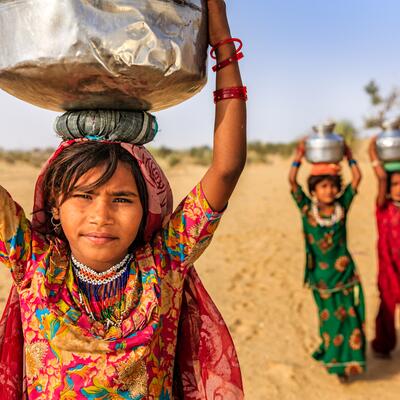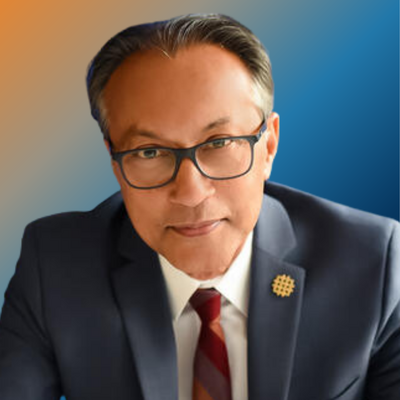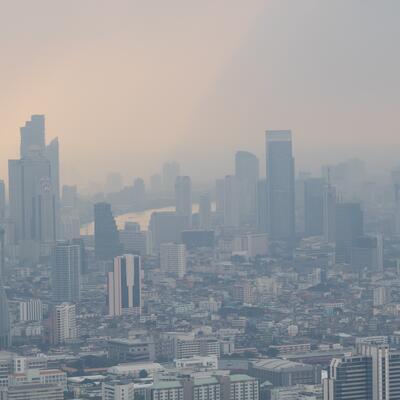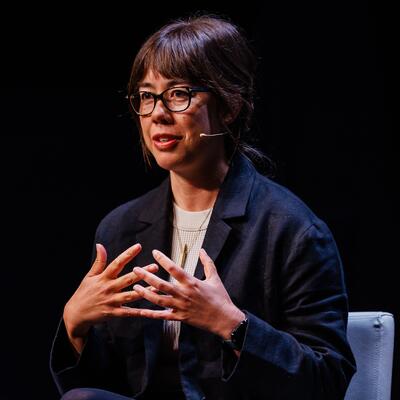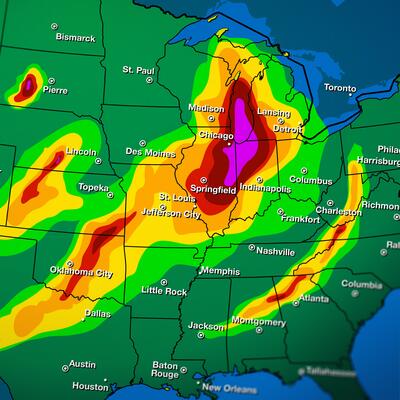
In the Eye of the Storm: TV Meteorologists Talk Climate
Guests
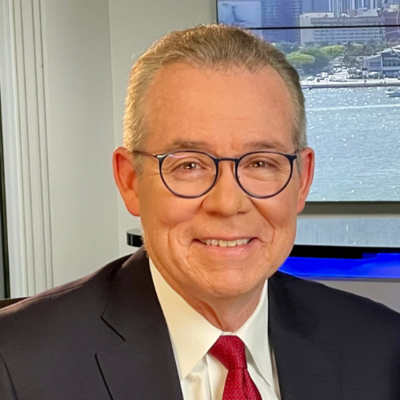
John Morales
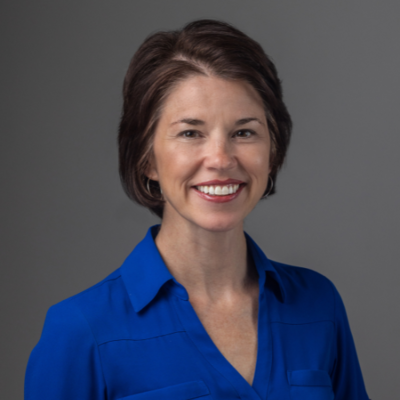
Bernadette Woods Placky
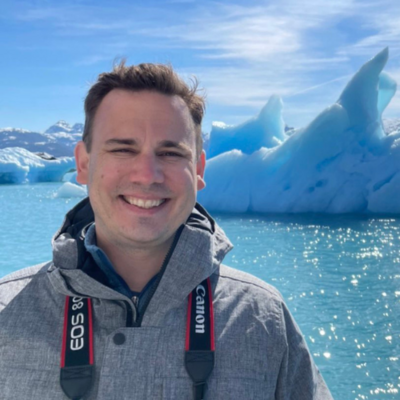
Chris Gloninger
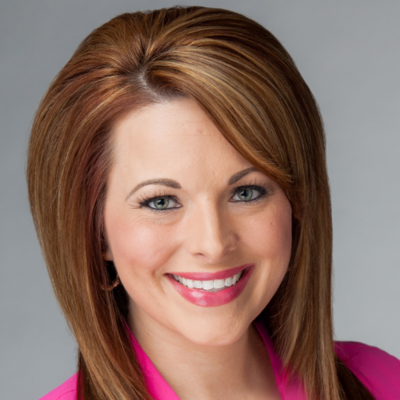
Amber Sullins
Summary
When it comes to communicating climate science, one group of people can have an outsized influence: weathercasters. Regardless of political affiliation or geographic location, people watch their local news. And on those local news stations is the weathercaster updating the community on the forecast. They are often the only scientists that people hear from on a consistent basis.
As climate change causes more extreme weather, TV meteorologists face a difficult task in communicating that connection to their audience. Sometimes weather events can become so extreme that it affects the weathercaster emotionally. That’s what happened to John Morales, Hurricane Specialist for WTVJ NBC6 Miami. When he was called in to cover Hurricane Milton, he found himself getting overwhelmed at the speed with which the hurricane was growing. The video of that moment went viral in October.
“We woke up to a mundane 50 mile per hour tropical storm. So here was suddenly a 160 mile per hour category five hurricane within the span of a day,” says Morales. He remembers the moment right before the cameras started rolling, “I'm looking at these numbers. I'm looking at a chart. I'm seeing the pressure drop. I'm doing the calculation in my head and suddenly it's my turn to speak.”
“I've been monitoring, analyzing and forecasting hurricanes for 40 years,” says Morales. Seeing how the speed and intensity of those storms have increased over those 40 years is part of the reason why Morales is an advocate for including climate change as part of his weather analysis. He understands the danger of extreme weather in his own backyard, “One of these days, there's going to be a mundane tropical storm in the central Bahamas, which 36 hours later is going to make landfall in Miami as a category four hurricane and catch everybody off guard.”
What happens when weathercasters want to include climate information in their reporting, but don’t have the time or availability to keep up with the latest science? Climate Matters is one program trying to fill that void. Chief Meteorologist and Climate Matters Director Bernadette Woods Placky says Climate Matters listens to weathercasters, hears what questions they have, and then brings in other scientists to help answer questions around modeling or data records, and then continues to build their confidence and trust.
Chris Gloninger is the senior climate scientist for the Woods Hole Group, Inc. But that wasn’t always his job. Before joining the Woods Hole Group, he was a TV meteorologist in Des Moines, Iowa. He went to the Iowa station specifically because he wanted to bring climate information to an audience that otherwise would not have heard it. Gloninger says, “When I got into the profession in 2006, I was told flat out you couldn't cover climate change. You couldn't talk about climate change.”
Unfortunately, Glonginger’s inclusion of climate change in his weather reporting at KCCI caused a backlash from some in the community. One viewer threatened physical violence, and his station told him that he could no longer cover climate. Gloninger says lack of support by the station led to him leaving his job, “You make that decision to go to a new part of the country, uproot, uproot. invest in this new town, make friendships, try to do everything you can to become part of this community, and then you feel like you were abandoned. Honestly, it's unforgivable, um, what station management did.”
Many miles and weather systems away, Chief Meteorologist for ABC15 Phoenix, Amber Sullins, is helping to bring a climate message to her city. In Phoenix, deadly heat is the main manifestation of the climate crisis. In the summer of 2020, temperatures were out of control. Sullins says, “We were not breaking heat records by a day or two or a degree or two. We were beating them by weeks, by 10-12 degrees. I mean, it was ridiculous.” She says her success at communicating a potentially polarizing topic in a conservative area boils down to her approach: “We have different roles in communicating what's happening to our climate. And my role as a meteorologist who works for a journalism company is to stay out of the policy side and to just present the facts.”
Episode Highlights
3:28 - John Morales viral video
9:25 - John Morales on his career and climate
13:24 - John Morales on climate in his forecast
18:05 - Bernadette Woods Placky on weathercasters and climate
21:46 - Chris Gloninger on his early work
27:02 - Chris Gloninger on using the phrase “climate change” on the news
28:37 - Chris Gloninger on his response to station management
34:17 - Chris Gloninger on his decision to leave his job
40:33 - Amber Sullins on her role as a meteorologist
45:22 - Amber Sullins on how extreme heat has affected her family
Resources From This Episode (3)
Full Transcript
Note: Transcripts are generated using a combination of automated software and human transcribers and may contain errors. Please check the actual audio before quoting it.
Greg Dalton: I’m Greg Dalton.
Ariana Brocious: And I’m Ariana Brocious.
Greg Dalton: And this is Climate One.
Before we get into this week’s episode, we need to acknowledge the re-election of Donald Trump and the profound implications for energy and climate.
In his first term, he eroded years of progress on environmental and climate goals.
On the campaign trail, he vowed to gut the IRA. And in his election night speech this week, he promised to tap what he called “the vast stores of liquid gold” on America’s public lands. Drill baby Drill is coming back.
Ariana Brocious: So now it may be up to state and city governments to continue addressing the climate crisis. And there are meaningful actions those entities can take. Much of the energy we use runs through wires and pipes regulated locally via building codes and land use policies.
Greg Dalton: Of course, we’ll be following all of that in the coming weeks and months here on Climate One.
Ariana Brocious: The election really drove home how divided our country is. But there is something that we all experience the same way. And that’s… the weather.
And actually, that’s what we’re going to talk about on today’s show. Specifically, the people we rely upon to let us know if it’s going to rain or shine.
Greg Dalton: Right, TV meteorologists are beamed and streamed into many people’s homes everyday, and are often the only scientists that the general public hears from on a regular basis.
Ariana Brocious: And more often than not, they live in the places that they are reporting on. They’re talking about storms and floods and extreme heat that they’re also experiencing firsthand. So weathercasters are trusted by their communities.
Greg Dalton: Weather reporting used to be way less complicated. Give the temperature, tell the people if it’s going to rain, and banter with the news team. In fact, David Letterman got his start as a weathercaster.
[Playback of Letterman weather clip]
Greg Dalton: His college degree was in telecommunications… so I think it’s fair to say that he was more of an entertainer than scientist.
Ariana Brocious: And then there’s Al Roker, who has been on TV forecasting the weather since 1974!
Greg Dalton: He’s a legit climate guy. I saw him speak at a climate conference last year.
Ariana Brocious: Yeah and as the weather has gotten more and more extreme, he’s started including climate messaging in his forecasts.
[playback of Roker and new climate normal clip]
Greg Dalton: According to a recent study out of Yale, 60% of Americans are worried about global warming. And some TV meteorologists say that the majority of their viewers want to hear about climate connections in their weather reporting. For others, that’s controversial.
Ariana Brocious: Climate doubters may be a noisy minority. But weather events keep getting more extreme and dangerous, and they’re affecting all of us.
And no one knows this better than John Morales – he’s based in Miami, where he reports on the weather for NBC 6. He’s been in the business for 40 years. You might not know his name, but you might have seen the video of him that went viral in October during Hurricane Milton… Here was this expert reacting to one of the most terrifying hurricanes he’d ever seen.
[Playback Morales Video]
It’s just an incredible, incredible, incredible hurricane. Uh, it has dropped (pause) It has dropped 50 milibars in 10 hours. Um. I apologize this is just horrific. Uh maximum sustained winds are 160 mph. And it is just gaining strength in the gulf of mexico where you can imagine the winds, i mean the seas are just so incredibly, incredibly hot. Record hot, as you might imagine. You know what’s driving that, I don’t need to tell you. Global warming, climate change leading to this and become an increasing threat for the Yucatan (voice catches) including Merida, Progresso, and other areas there.
Ariana Brocious: So take us back, if you don't mind, to that moment. What was going through your mind when you were delivering this, report to your viewers?
John Morales: Well, you have to keep in mind, I mean, uh, first off, I was up very, very late the previous night because they had asked me, the NBC station had asked me to be in the studio, um, particularly because the biggest audience of the week generally follows the big NFL game on Sunday night. But that NFL game got delayed.
By weather, ironically. The game started very late. Uh, the newscast started at 1. 15 in the morning. Um, and because I live far from the TV station, basically I didn't get to sleep till between 2. 15 and 2. 30, and the hurricane was already rapidly intensifying. So I was up early the next day. I, you know, I got maybe four hours of sleep, uh, checking on everything having to do with the hurricane, and for the noon newscast, It was going to be my first newscast of the day from from this home office, uh, and in the minutes prior to the newscast starting, the National Hurricane Center issued an urgent bulletin indicating that the hurricane had reached category five intensity, mind you, Sunday morning.
Uh, we woke up to a mundane 50 mile per hour tropical storm. So here was suddenly a 160 mile per hour category five hurricane within the span of a day. Uh, so, so that news itself is, is, is very shocking. And what happened to me was, you know, I'm, I'm, I'm, I'm trying to look at the, at the, at the camera because they're about to present me.
I'm looking at these numbers. I'm looking at a chart. I'm seeing the pressure drop. I'm doing the calculation in my head and suddenly it's my turn to speak. So I clench my eyes, uh, you know, I say what I said about it being an incredible hurricane and when it was time to talk about the drop in barometric pressure, which, which, uh, Which is such a significant data point for a meteorologist, right?
I mean, you know, keep in mind the record holding fastest intensifying hurricane in the Atlantic Basin dropped 97 millibars in 24 hours. And here's one that did 50 in 10 hours, right? So I'm going. You know, this thing is is the most incredible hurricane I've ever seen.
Ariana Brocious: want to underscore one thing which I think is really interesting that you said in the in the tape um, I apologize and that's a natural thing to say because you're professional and we were sort of taught not to express emotion, but you're also trying to communicate that this is a really, really serious thing coming right now.
And I feel like you were just kind of being a human and I'm curious what you, what you were thinking, like, did you feel that you needed to apologize? Did you feel that you had somehow overstepped or?
John Morales: Yeah. I mean I was just a little bit embarrassed I mean to be completely honest, I didn't see that coming . I mean, there are underlying reasons that I can point to as introspection of how I got to that point.
However, I could have not expected it to make me, you know, break down or lose my composure on TV. By the way, I mean, there's a lot, you know, I've been doing hurricane coverage for decades, and there's a lot of other, you know, semi viral moments that have happened along the years. I mean, you know, I've cursed on TV and didn't get fired.
I, you know, I sometimes I've been extremely stern with the public. You know, I remember this time during Hurricane Irma telling people in the Florida Keys, you know,the My statement was if you're if you're sitting on a Florida key right now, Get out, right?
So so I mean there there's all these but this one But this one was different. It was different because while I've Uh, I paused and, and, and, uh, almost lost it before during Hurricane Maria's threat on Puerto Rico, the eve of the hurricane, because of course, Puerto Rico is where I grew up.
My mother lives down there. I mean, I did have that type of a moment on social media, but not like this, not to the point where my voice was quivering to the point where it did here. So, so. Back to your question. Why did I apologize? I think it was awkward and a little bit embarrassing. It was a natural thing to do.
Ariana Brocious: And you know, for viewers that have been watching you for decades, you know, it kind of underscored that you are a person in the community that, they trust you, you bring them reliable reporting, that you care. And I think that that really transcends the, screen in a sense. But this happened when the news was still fresh with images of Hurricane Helene, which of course wreaked havoc on the East coast, killed more than 230 people.
And so for Floridians who know and trust you, um, this did really drive home the urgency of this particular storm. And I'm curious, What have you been seeing, uh, and reading and, and researching in your career that has gotten to today where we're really seeing these incredible storms happen?
John Morales: Well, for a perspective, people have to realize that 2024 is my 40th anniversary. As a professional meteorologist, it's been a long, long time and my entire career, except for five weeks that I spent in Washington D. C. But the rest of my career has always been in the tropics and subtropics. I've been monitoring, analyzing and forecasting hurricanes for 40 years, right?
So the changes I've observed, I've observed them in real time and there have been changes. You know, and by the way, I mean, I'm going to say these things and I'm not just saying them anecdotally because John Morales saw them. These are things that are backed up by peer reviewed science. And there is definitely a greater proportion of the tropical cyclones that are forming anywhere in the world that are reaching violent category four and five intensities.
It's not that there are more tropical storms and hurricanes as a whole. It's not that the count of every single tropical storm and hurricanes is higher. But the percentage of the ones that are forming are reaching these incredible intensities. Um, Uh, and it's just happening at the drop of a hat now. So one of the things that I wrote about last year after Hurricane Otis, which went from nothing to a category five and absolutely flattened Acapulco basically without warning.
Okay, and imagine the suffering those folks went through and the surprise those folks went through in having to deal with, with a category 5. Which, I'll add another parenthesis, it, nothing bothers me more than people on social media, uh, you know, clapping back, uh, well, you know, you were so concerned about Milton as a cat 5 and look at, you know, it got to the coast as a cat 3.
That's no big deal. Yeah, yeah, no big deal. You know, why don't you go through a cat three and tell me what it's like. Anything that is cat three and higher is devastating. And if it's category four or higher, it's basically catastrophic, catastrophic. Puerto Rico saw it, you know, the Keys saw it, the Bahamas saw it, Texas saw it, Louisiana saw it, right?
One of these days, there's going to be a mundane tropical storm in the central Bahamas, which 36 hours later is going to make landfall in Miami as a category four hurricane and caught catch everybody off guard. That's my market. Okay. This is the market I've been on TV for 33 years, an audience that knows me very, very well.
And they've known me as an all not alarmist. As a just the facts meteorologist, but if now there's a higher chance than there's ever been in our lifetimes for a 50 mile an hour tropical storm in, you know, the central Bahamas, making it to Miami as a cat four a day and a half later, if that's the case today, I'm not sure I can continue to be a non alarmist.
It's changed the way that I deliver the weather.
Ariana Brocious: Well, and you're referencing, you know, obviously the, the things you know most and are experiencing there are hurricanes. But if we're seeing the same kind of growing intensity of a lot of other weather events too, right? intense rainfall, flooding, intense droughts, a lot of things are being amplified by climate.
And so, you know, even in that clip we heard at the top, you make that connection pretty quickly. You say this, we know what's causing this, it's warmer oceans, it's climate. So, um, you live in Florida, which, you know, is a conservative state. And so for some climate change, the term even could be politicized or viewed as politicized.
what is in your weathercasts and how much of it touches on climate.
John Morales: Well, I'm proud to say that, um, You know, there's basically a handful or less than a handful of, uh, weather casters in the U. S. that dared start to provide climate context, um, going back 20 years. You know, Jim Gandy in South Carolina, Mike Nelson in Denver, myself, maybe one or two other people. I mean, it's, it's a very small group.
So, that means that my station was definitely on the forefront of, of. You know, communicating climate context to the viewers, even within weather segments, because it's one thing to do what I, what I basically started doing way back in the 90s and into the aughts. I would do longer format type of environmental slash climate reporting with all the challenges of false equivalency that journalists were requiring of me.
By journalists, I mean, you know, managers in the newsroom that don't understand that the scientific process does not yield two sides to the coin, right? But journalists trained to always present both sides of a story. Uh, so it's very difficult for a scientist to be presenting, uh, science when you're asked to, you know, find somebody that disputes the theory of gravity, right? Anyways, so all those challenges. But that morphed into inserting climate into the actual weather segment into our two or three minute weather segment and that happened well first because I would rather ask for forgiveness than permission. It's because I did not ask for permission. I just started to talk about it more and then the opportunities start to multiply.
Sadly, Extreme weather events multiplied in this century. Starting in the aughts, through the teens, and now into the twenties. Every year, we get more billion dollar disasters in the U. S. We see more severe flooding all around the world. Heat waves are becoming longer and more extreme and deadlier as well.
All these are symptoms of, of, uh, a warming climate. And when these things happen and, and they're part of my weather segment, I normally follow it by saying something as simple as, and you see what you're, what you're seeing here happen is consistent with what you would expect in a warming planet and was predicted to happen decades ago by climate scientists.
And that part of it, And that allows people to make that connection. And it's important that broadcast meteorologists do that more often.
Ariana Brocious: John Morales is a hurricane specialist at NBC six in South Florida. Thank you so much for joining us on climate one.
John Morales: Great to be here. Thanks.
Greg Dalton: After the break, we’ll talk with another meteorologist… who’s trying to bring climate news to his audience… no matter where they sit politically.
Chris Gloninger: I found another way to kind of cover it that helped both liberal and conservative part of the audience appreciate the issue,
Greg Dalton: That’s up next, when Climate One continues.
Ariana Brocious: Help others find our show by leaving us a review or rating. We’d also love to know what you think. Thanks for your support!
Greg Dalton: This is Climate One. I’m Greg Dalton.
Ariana Brocious: And I’m Ariana Brocious.
Greg Dalton: We’ve talked about how TV meteorologists… are in a unique position. They can reach people that other climate scientists and communicators… often can’t.
Ariana Brocious: True, and it’s also true that TV meteorologists aren’t always climate scientists themselves. And with the huge amount of new information coming out that may shape their reporting, they don’t always have the time or the resources to dig into the research. Especially as they're preparing to go live on the air every day.
Greg Dalton: But there’s a program that offers them tools to better understand and more effectively communicate the reality of the climate crisis. Bernadette Woods Placky leads Climate Matters, an organization that provides resources like data analysis, localized graphics, and science explainers to local media who want to tell climate stories.
Greg Dalton: not long ago, a lot of TV meteorologists were skeptical about climate change. They were, they were a tough audience. And from. The polls really moved from 2010 to 2017 from, as you know, from 50, about a half to almost all of, uh, meteorologists accepting that climate change is happening. So what changed during that timeframe with this audience?
Bernadette Woods Placky: Well, I think that there's a few things that changed. First of all, most TV meteorologists weren't anti science, they just had questions and they were looking for a solid source to answer those questions.
Greg Dalton: Yeah, I get that. And I'm having to. I was still puzzled by that after the IPCC had come out with so many reports and there was this international consensus that this group of professionals trained in meteorology still didn't accept, you know, the scientific consensus, but I guess, yeah. Right?
Bernadette Woods Placky: Well, there are a lot of people out there, unfortunately. Who weren't accepting of the science, correct? And you're, you're correct that they are trained in atmospheric science. There was also a lot of misinformation out there that was coming at TV meteorologists, and that misinformation was targeted at them.
And so that adds another layer of their confusion of who to trust, who not to trust with the state of the science as it continued to evolve as they were actively working. And you have to understand
Greg Dalton: are you? Wait, hold on. Can I just ask? Are you saying the oil industry, the fossil fuel industry targeted TV meteorologists in their misinformation campaign?
Bernadette Woods Placky: well, the Heritage Foundation had sent out information to TV meteorologists during this time.
Greg Dalton: Okay, so that's a yes. So they were targeted. And I remember seeing and holding in my hands some real slick, uh, materials, uh, intended to sow doubt.
Bernadette Woods Placky: most of my learning around climate change came in this current position at Climate Central. I didn't know as much when I was on air, but I don't think I was unique.
most TV meteorologists are, they ground themselves in science, but they're not keeping up with every single publication that comes out academically with every other thing that they're balancing and then on top of that, think about this.
So TV meteorologists are used to being told all the time how they're wrong. right? And so they want to really understand the scientific connection to something before they feel that confidence going forward. So we came in from Climate Central and our collection of friends with George Mason University, the American Meteorological Society, NASA, NOAA, all under this NSF grant that formed Climate Matters and was able to work with them.
to hear what questions they had, help answer those questions, bring scientists forward who are working in those specific areas where they may have questions around modeling or data records, and then continue to build that trust with TV meteorologists on where this data to science was, how they could use language around it, where their audience was with questions around climate change and how to answer those questions.
You have science. You have public opinion on your side. People are genuinely asking you what is happening and they're looking for information and you're in that position to make those connections for them.
right?
Greg Dalton: Bernadette Woods Plackey, thank you so much for sharing your insights with us on Climate One.
Bernadette Woods Placky: Well, thank you for having me.
Ariana Brocious: Resources like Climate Matters are really valuable for people in the media who want to tell climate stories clearly and accurately. But what if not everyone in the audience wants to hear them? That’s what happened to Chris Gloninger and it upended his life.
In 2021, he was working as a TV meteorologist in Boston. Then, he got offered what seemed like an incredible opportunity: a station in Des Moines, Iowa wanted to bring him on as chief meteorologist – and they specifically wanted climate change to be a part of his weathercasting. This was exactly the kind of reporting Gloniger had wanted to do for his entire career…. even though, back when he started out, he was a bit of an outlier.
Chris Gloninger: When I got into the profession in 2006, I was told flat out you couldn't cover climate change. You couldn't talk about climate change. It was, um, kind of taboo at the time. And then we entered into this. It's a phase where news directors or news managers in general would say, you need to tell both sides.
And in journalism, that is known as a false balance, where there's plenty of scientific evidence that shows that humans are causing climate change versus the idea that climate change is a hoax. But it was in 2016 where I really picked up some momentum in covering climate change and that eventually around 2018 launched the country's first weekly series on climate change in Boston on NBC and that series aired every single week, which was super rewarding.
Ariana Brocious: Yeah. And to have pioneered something like that is really cool. I mean, did you, so you obviously, I would assume had support at the time from your station. Um, were you in charge of most of that content? Were you creating it?
Chris Gloninger: I had the help of an executive producer, and for us to pitch a weekly series, we needed to have a sustainable stream of content, and management at the time, I think, worried that we'd run dry of stories, but in a city like Boston, it was impossible. It was overwhelming how much content there was. And then it turned into prioritizing which stories we really needed to tell immediately, right?
Uh, the infrastructure system, the T or the subway system in Boston, incredibly vulnerable. And that was, you know, one of the first stories that we covered versus other stories about the switch to renewable energy or the mitigation side of it, which is important, but really, you know, We're starting to see chronic flooding.
We needed to tell those stories up front. Um, and the management at the time saw it and said, Yeah, okay, we'll give you this series and you can do it weekly.
Ariana Brocious: So you've been in Boston. Um, and in 2021, you were offered a job as chief meteorologist in Des Moines, Iowa at KCCI. And, uh, this was a big step for you, right? It was a promotion. It was also a quite different place than where you'd been living. So what did you think about when that offer came in, that job offer came in?
Chris Gloninger: I was optimistic and To be honest with you, I wouldn't have left a job in a top ten market just even for a title to be chief meteorologist. I left the opportunity in Boston for this new job because it was the chance to speak to an audience that hadn't really heard about climate change. Previous chief meteorologist at the station, the previous two chiefs didn't cover it, didn't talk about it, didn't integrate it into their evening newscast. I saw it as an opportunity.
Ariana Brocious: Yeah. So let's get into that. So you accepted the offer. talk about kind of how you began to do that, how you incorporated climate into your experience working there.
Chris Gloninger: We wondered when the right time would be to do it. But we had one of the hottest summers on record. We had the largest tornado outbreak on record in the state of Iowa.
And it didn't happen during tornado season. It didn't happen during tornado season. It happened December. It happened a couple of weeks before Christmas. I said, we need to do this now. And I would find ways to weave it in to my weathercast. It wasn't a standalone feature that I did in Boston, where I was the weekend meteorologist and did the climate reporting during the week.
But I would regularly tie it in to the evening newscast in only 30 to 45 seconds. I wasn't preaching, wasn't talking down to people in a way where I was educating them or feeling that they didn't have the education to understand what I was talking about or the, understand the science of climate change.
But I found ways to kind of connect with viewers and talk about how many more 90 degree days we had during the summer, to talk about how we're seeing an increase in heavy rain events causing flash flooding. But at this flip side, we have this weather whiplash where we can go into extreme droughts in a short amount of time.
But then I found another way to kind of cover it that helped both liberal and conservative part of the audience appreciate the issue, because what's lost on many news managers, many that are in the communication side of climate change, is that there are ways that you can find and connect with the conservative audience, that the science can resonate with them by using their terminology and their philosophies.
Including, for example, energy independence. What's more independent than harvesting energy in your own backyard? Not only did these wind turbines provide a huge boost to the power grid, they were supplemental income for farmers who had a bad season.
Chris Gloninger: I went back and forth with station management and ultimately, when they told me to stop talking about it, it wasn't just using a different phrase, it was just avoiding the topic altogether because they were worried about the pushback. I didn't use it all the time though. Not, I would say you can see the overall trend.
As carbon dioxide goes up, the atmospheric temperature goes up. Uh, that is a causation. That is a causation relationship where with one going up, the other follows. I didn't want to turn people off, but I also thought it was important to kind of integrate it for people to realize that it isn't a polarized issue. It's, it's science. It's facts. It's data.
Ariana Brocious: Yeah. And you know, Iowa's a state full of agricultural people, it's farmers, you know, most people there are somehow tied to that industry and, um, care deeply about it and experience it, right. They're experiencing these weather impacts hitting their bottom line. Um, so it's a, yeah, maybe a more, um, open audience for that.
So, You were there, um, covering climate, covering the weather. Um, by the following summer, things had changed at the station. As you kind of touched on the management told you there were too many viewer complaints coming in about the quote unquote politicization of the weather forecast. They wanted to hear less about climate change.
So what was your response to the station management then?
Chris Gloninger: Yeah, the station management at the time brought me out to lunch and it's, it's kind of comedic because I later found out it was, I was brought to a public setting. So I wouldn't be visibly upset and I would curb my emotions when I was told that I could no longer do what I was hired to do, which I would hope at that point I'd be professional enough in my nearly 20 year career to be able to have a civil conversation.
But I certainly wasn't going to just roll over. Um, I said, I disagreed with their approach, I, in a bit of snark, said the term COVID has become a polarized term. So imagine covering the pandemic without being able to use the term. It just doesn't make sense. And I said, you're allowing a small part of the viewing audience to editorialize our newscasts.
That goes against any Ethics of journalism that exist, you shouldn't be doing that because we're simply stating facts, um, and they kept saying, well, research doesn't care about the how or the why. And then it got down to the point where they were writing me up for obscure things. I, promoted a tweet from Patagonia that said that they were giving all of their profits to, uh, to charitable organizations, to nonprofits that were doing work in the climate space.
And I said, what an amazing company, you know, where do I sign up? I mean, a harmless tweet like that, But that was taken and turned into a, um, I don't have journalistic ethics because I tweeted that out.
I mean, that's, that's truly ridiculous, but that's, we got to that point.
Ariana Brocious: So speaking of Twitter, uh, In July of that year, you wrote something on Twitter that I'd like to ask you to read for us.
Chris Gloninger: Yeah. Um, My climate coverage has garnered negative feedback, but last month I received the first threat, followed by a flow of harassing emails. Police are investigating. It's mentally exhausting, and at times I've not been okay.
Ariana Brocious: So I know this was a really difficult experience. Can you take us back to what was happening and what you were feeling then?
Chris Gloninger: Yeah, I, look, as meteorologists, we are seasoned for the occasional uh, hey, you know, You were forecasting dry we, uh, weather and it rained on my wedding day. Yeah. That's a bummer. That's terrible. Right? And I fully anticipate and expect people to write in to air their grievances, right? This was different.
This targeted my safety, this targeted the safety of my family. Um, it was not just one email. And it reached a peak when I was getting back from a haircut, my wife was out running errands, and I read and re read and re read this email, as I just, My mind was racing, but I think we've all had that experience where you feel paralyzed, your heart's pumping, your brain is racing, but you physically can't do anything.
It's almost like you wake up out of a nightmare and you're not sure what's happening. Uh, and I called my wife as soon as I was grounded and said, where are you? And she said, I'm out shopping still. I said, you need to come home. I'll explain when you get here, but. I'll be calling the police as well. Uh, and she beat the police to the house, uh, by a few minutes.
So I showed her the email. She was shaken. It was, It's the same person who sent a series of harassing emails, who asked what our home address was, and they'd like to give us an Iowa welcome. kind of like what the blank tried to do to Justice Kavanaugh.
And police knew instantly that that was, um, A death threat because it was when a subject was apprehended with zip ties and weapons trying to attack, presumably kill Justice Kavanaugh. And they said they were concerned because this wasn't just a A, hey, we're gonna kill you. This had, essentially, a plan.
Um, and, there's no way to truly explain the mental trauma. I was a firefighter in college.
It's something I did for four years. I saw horrific scenes, uh, with tremendous loss. Um, but the psychological toll that this took ultimately ended up with a year of constant therapy. And even to this day, when I hear threats made against some of my colleagues, um, regarding weather modification, it reopens the wound.
Ariana Brocious: I'm sorry. Thanks for sharing that. I realize it's a lot to revisit. Um, so you took stock of everything, um, and left the station. Um, and it was that threat, right? But, but everything
Chris Gloninger: Yeah, I think if it was just one thing, we would have been able to manage and, and push through, um, But, when you make a personal sacrifice, and I think I now I'm more emotional about this than I am even the death threat, when you make that decision to go to a new part of the country, uproot, uproot. invest in this new town, make friendships, try to do everything you can to become part of this community, and then you feel like you were abandoned.
Honestly, it's unforgivable, um, what station management did. I look back at it, and I mean, it was the ultimate form of betrayal. Um, And I wasn't going to stay there just to be chief meteorologist.
Ariana Brocious: Yeah.
Chris Gloninger: I'm pretty open about this. I mean, I went into a sector which pays what it pays. I love my new employer, but ultimately took a 70,000 pay cut, which is really hard to stomach.
But I did it because this is the biggest issue of our lifetime. I wasn't going to get, stay to get paid just to tell people what the next seven days are going to be like. I just didn't feel like that, that was right. I felt like I should be doing more. So it's been a year of a lot of ups and downs, a lot of struggles, a lot of hardships.
Um, but I think that the rawest emotion I have is, is the sense and feeling of betrayal. Um, and I felt like I was crazy. They were telling me. to stop talking about it, yet they hired me to do that. And I felt like I was literally going crazy. Like, did I misinterpret what they were saying? was it, you know, mixed messaging?
Where did this go off the rails? But there was this tweet that I saw that was when the Washington Post first covered the story. And it was Matt Surwey is now a meteorologist in, in Minneapolis. And he wrote and said, I interviewed for this position and it was heavy on climate, meaning that's what the station wanted.
And I hope that they gave him the support he needed. Sure, they put me up in a hotel until we could get a security system installed, but the support that I really needed was the support to keep going, to keep being a climate messenger. Not an activist, but a messenger in a way of bringing science to the people for them to understand why this is such a critical issue. Um, and they didn't accommodate that. But that kind of gave me peace of mind that I wasn't crazy. That that was in fact what they wanted until they didn't. Until they allowed a small part of the viewing audience to editorialize their newscast.
Which is journalistically unethical.
Ariana Brocious: so one of the most, I think, rewarding outcomes of this for you is that, um, you found after you left, you had actually reached a lot of people and that they were really grateful for your coverage. So can you tell us about that? What kind of support you, you found after your departure?
Chris Gloninger: Yeah, it was, um, it was kind of sad to see, uh, it was a little too, too little too late. And I printed out every single email that I received from just Iowa viewers. I mean, when it became an international story, I got emails and support from all over the world, which is truly inspiring. But I thought what was more meaningful was the fact that they never showed me their research on the fact that people, they claim didn't want to hear about climate change. And I went through and I had this friend who I call my Iowa dad, uh, who's in a trial attorney out in Iowa, and he made multiple copies at his, at his law office of all these emails, hundreds of them. And I put post it notes on the letters from truly conservative parts of the state from Pocahontas to, um, Sheridan to, I mean, areas that are so red that I was pretty confident that these people that were writing were conservative, who appreciated what I was doing. Uh, and as a, as a parting gift, I gave one of the binders to my bosses and said, I don't know where you got your research from.
I don't know who you paid, what consulting firm to do this. But this is invaluable research that you couldn't really even pay for. This is every email just from the Iowans that I've heard from and gave it to them on my way out.
Ariana Brocious: Good for you.Chrisinger is a former TV meteorologist now working as the senior climate scientist at Woods Hole Group. Thank you so much for joining us and sharing your story on Climate One.
Chris Gloninger: I’m happy to be here, thanks so much.
Ariana Brocious: We’re going to take a quick break. And when we come back, meteorologist Amber Sullins describes how broken heat records in the summer of 2020 got her Phoenix audience interested in climate change.
Amber Sullins: We were not breaking heat records by a day or two or a degree or two. We were beating them by weeks by 10-12 degrees, I mean it was ridiculous.
Ariana Brocious: That’s up next, when Climate One continues.
Greg Dalton: Many miles and weather systems away… in Phoenix, AZ… Amber Sullins has been broadcasting since the early 2000s. As stretches of extreme heat get more intense and last longer, she’s also tried to incorporate more climate messaging into her work.
Amber Sullins: As a broadcast meteorologist, my job every day is to tell the weather story, right? Like, What is going to happen, get people through their day, get people through the next few days, but also provide context.
And, you know, when I started out in the early two thousands, the only way that meteorologists were doing that is just through the daily almanac. Here's our high today. This is what's average. This is the record, and it was just a simple as that. But in 2013, I really started incorporating more perspective because things were changing.
Things were changing all around us. And as someone who looks at the data every day and is completely engrossed in this, those changes were so obvious to me.
Greg Dalton: Right. How do viewers respond when you started to talk more about this context and use? That word climate.
Amber Sullins: Yeah, so back in 2013 when I first started doing it there, you know, there was a little bit of resistance people not wanting to connect it to climate change, just chalk it up to another extreme weather event. But I think as far as what's happening here in phoenix, what really changed Perspective for a lot of people that I serve in this community was the summer of 2020 when we were just absolutely shattering heat records.
We were not breaking heat records by a day or two or a degree or two. We were beating them by weeks by 10 12 degrees. I mean, it was a ridiculous amount of heat in terms of just how hot it was and how long the heat lasted. And I think from that point forward, especially native Phoenicians like me who have been here for decades, really knew that something was not right. This is not normal for us. What is going on.
Greg Dalton: right. So 2020 was a big jump that like, shocked people. And it continued to get hotter. In 2023, health officials in Maricopa County reported nearly 500 heat related deaths. That still boggles my mind and you continue to break records. What I think this year is 100 days of temperatures over 100 degrees. You know, how is this year affecting your, your listeners?
Amber Sullins: yeah. I mean, we've had 142 triple digit days already. And you know what? We might even have a triple digit day on Saturday. So that would be the second latest triple digit day ever recorded in Phoenix. So people are, they, they know that something's changing here and they want to know why.
I mean, some people that don't want to Believe or even understand how greenhouse gases are trapping heat and causing the planet to warm. They wanna blame it on the urban heat island effect. And here in Phoenix, the urban heat island effect is a major problem. It really elevates temperatures in the overnight hours, but it's not the whole story.
Greg Dalton: And the heat island effect is when concrete and asphalt absorbs heat from the sun, making cities hotter than surrounding areas.
Amber Sullins: Yeah And so I try to give viewers perspective on. You know, here's what's happening with the overnight lows. We know that a vast majority of these really hot overnight temperatures in Phoenix in the center of our heat island are really driven by the heat island effect, but the heat island effect has a much lesser footprint on our daytime highs.
And those are getting ridiculously high too, 110 degree days. We now had 70 of those this summer, 70 days at 110 degrees or hotter.
Greg Dalton: How is all this extreme heat affected you and your family?
Amber Sullins: Well, I mean, it's a different world. I, I was born and raised here in Phoenix, uh, so I know how our summers used to be. We used to be able to at least escape the heat by going to the local swimming pool, or if we were lucky enough to have pools in our, our backyards or friends' backyards. But now, um, you know, in the dead of summer, the pool feels like a hot tub.
So we're, we're not getting that relief and then now we're coming into the right, you know, it was right. It's very tepid. It's not, it's not refreshing. Um, but we're also getting into the heat stretching now so far into fall. So that's affecting our kids when they go back to school. There's days when we're under excessive heat warnings and the little children are not allowed on the playgrounds for recess because it's too hot and dangerous.
They have to stay inside. It's affecting the fall sports that our kids are able to participate in. And it's really becoming a dangerous situation in terms of the risk of heat exhaustion and heat stroke while our kids are out playing in these sports. And that even goes into Late September and October, we had 117 degree day in late September this year. It broke the daily record by nearly 10 degrees.
Greg Dalton: Wow. And this has also hit home for you. I thinkYou know, your son is a high school football player. How has it affected him?
Amber Sullins: Yeah. He plays football his games are Saturday, middle of the day. And that 117 degree day that I told you about, that was a Saturday.
And as a meteorologist, I saw this coming. I saw the heat coming the week leading up to it, and I'm waiting to hear from the coaches. Okay, the game is gonna be canceled or it's gonna be rescheduled. I hear nothing. And by Thursday, I think to myself, well, my kid can't be the only one having to deal with this.
So I start to email leagues all across the valley just saying, Hey, this is Amber Sullins, your chief meteorologist at ABC 15. I just want to let you know, in case you haven't checked the weather forecast that we're under an excessive heat warning on Saturday. It's going to be 117 degrees.What's your heat contingency plan for these games? Because these temperatures are not safe and the heat risk sent out by the national weather service and the CDC says that the risk for heat exhaustion and heat stroke is extreme. So please let me know what your plan is. And a lot of the leagues got back to me and said, thank you so much for bringing this to our attention.
We're making some adjustments. Some leagues didn't respond at all. Some leagues only canceled afternoon games. But I think this goes to another really important point that let's say it's 117. That's our high. We hit that at four o'clock in the afternoon. This time of year, by noon, it's already up to about 107, which, which it was that day.
107 degrees at noon is not the same as 107 or 107 degrees at 5 or 6 p. m. because of the UV index.it feels a lot hotter. You're getting that radiational heat on you.
So now we have to broaden this. Okay, we can't have the kids out there during the hottest time of the day, but we also can't have the kids out there during the time of day when the UV index, that radiational heating is making it feel even worse.
Greg Dalton: So what happened to your son's game?
Amber Sullins: It, uh, it did not get canceled. So I woke up Saturday morning and my boys were getting ready for the game, my son and my husband.
And I said, what are you guys doing? And my husband said, well, we're going to go to the game. It wasn't canceled. I said, what do you mean it wasn't canceled? So, you know, as a meteorologist, I'm, you know, very concerned. I sit down to breakfast with my son and I say, you know, SJ, you know, it's going to be 117 today.
And he's like, yeah, mom, that sounds really bad. I said, how do you think it's going to feel in those football pads. He's like, yeah, it's gonna be brutal. I said, you know, I, I think you think you can handle it, but let me ask you this as a quarterback. Do you think that the offensive line who's supposed to protect you, do you think that those guys are going to be okay in the heat?
Greg Dalton: Mm hmm.
Amber Sullins: And he said, yeah, mom, you're right. I don't think I should go.
So we, we pulled him, his team still went out there and played.
Greg Dalton: Well,
Amber Sullins: And he, you know, he had a little bit of fomo, a little fear of missing out. He was a little bummed, but I felt like, you know, I had a responsibility as his mother and as a meteorologist who knew better to have this conversation with him and not kind of lay down the law and say, you're absolutely not going, but to give him the information and talk him through it so that he can think critically about whether or not this is a good idea.
Greg Dalton: wow. That's uh, that's quite a story perhaps a leadership moment for him of some sorts, you know, um, you know, this is getting into totally new territory, uh, for all of us. And, uh, A video of broadcast meteorologist John Morales breaking down on air while reporting about Hurricane Milton recently went viral.
I'm curious what your reaction was when you saw that video of John.
Amber Sullins: Um, well I've known John personally for, for many, many years. Um, We were connected through the American Meteorological Society. John and his son were visiting years ago. I took him for a hike on Camelback Mountain, kind of showed him the lay of the land, and we talked about climate change on that
Greg Dalton: Hmm.
Amber Sullins: And so I know him and watching that video was very, very powerful because I know that that was real raw emotion.
This really weighs heavily on him as it does a lot of people who know and understand weather and climate. And, um, you know, so I, I really, I could feel it along with him.um, you know, he is in a unique position now where he's kind of semi retired and he could be a little bit more candid on things than, than some others can be.
And so I think that's a very powerful position for him to be in as well, to really kind of, um, take us into the future and be a catalyst for change.
Greg Dalton: So, meteorologists sometimes describe their work as, as protecting people, you know, as you said a little bit, getting people through their day. Um, have you ever come close to breaking down yourself? Wanted to cry or shout or scream with what you're, what you're seeing?
Amber Sullins: I think it's for me, it's more, more anger and annoyance than sadness. But, uh, you know, the, the, the week leading up to my son's game, not being canceled was very frustrating because you feel like you're shouting from the rooftop and it's falling on deaf ears. So, yeah, I think we just, we, we just need to keep going presenting the facts and empowering people to make good decisions, but also be willing to maybe take it a step further if people aren't listening, like I did for the heat thing, like I want to know how you're going to keep people safe.
Greg Dalton: Right. Phoenix is pretty conservative area. are you aware of the, yeah, the political market that you're operating in, whether it's, you know, within the company or within the viewers, do you feel like there's some constraints?
Amber Sullins: Well, you know, I'm, I'm, I'm very careful to keep everything that I am talking about very, you know, fact based. Because that's what I think people need. And I, a lot of us, we have different roles in communicating what's happening to our climate. And my role as a meteorologist who works for a journalism company is to stay out of the policy side and to just present the facts. And so that's, that's what I do. just give people the fact based information about what's happening, so that they're empowered to make good decisions for themselves, for their families, for their communities.
And that's, that's what I'm trying to do.
Greg Dalton: And that's what a lot of scientists say, that they just present the facts. And yet some scientists have crossed over into advocacy because they feel like they just can't, uh, the confines of their professional conventions, they feel morally, I guess, called to transcend those. Do you ever think you ever think about that? You know, when you might like take some risks because it sounds like there's some job risks for you to do what John Morales did. You kind of said like, Oh, he can do something. I can't.
Amber Sullins: Well, you know, I think we all have a role to play and that it's all, it's gonna take all of us combined. We can't be all things to all people, right? Everybody is gonna have their specific lane and their role to play in this, and mine is to not try to alienate even one single viewer, but to bring them all in.
Amber Sullins, thank you so much for sharing your insights from Phoenix with us.
Amber Sullins: Thank you. Thank you for having me.
Ariana Brocious: And that’s our show. Thanks for listening. Talking about climate can be hard, and exciting and interesting — AND it’s critical to address the transitions we need to make in all parts of society. Please help us get people talking more about climate by giving us a rating or review. You can do it right now on your device. Or consider joining us on Patreon and supporting the show that way.
Greg Dalton: Climate One is a production of the Commonwealth Club. Our team includes Brad Marshland, Jenny Park, Ariana Brocious, Austin Colón, Megan Biscieglia, Ben Testani and Jenny Lawton. Our theme music is by George Young. I’m Greg Dalton.
